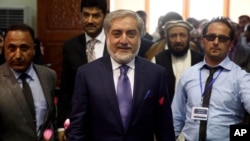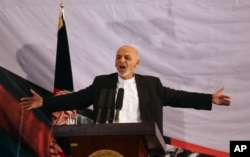The runner-up in Afghanistan's disputed election, Abdullah Abdullah, on Thursday congratulated his rival, Ashraf Ghani, on becoming president, seeking to quell fears of unrest after the two agreed to share power.
In his first public address since former finance minister Ghani was declared the winner on Sunday, Abdullah, a former foreign minister, told his supporters he had to accept a deal to avoid violence for the sake of the people.
“Taking the decision at this moment to go towards violence is very easy but we are resolved and determined to tolerate all bitterness and suffering,'' Abdullah said.
“If, God forbid, Afghanistan had gone towards instability, how could we maintain people's rights? How could we deliver on our promises to the people?''
Ghani is due to be inaugurated on Monday.
Afghanistan's Western allies have been hoping a smooth transfer of power would consolidate the country's progress as most foreign troops prepare to leave after nearly 13 years of war against Taliban insurgents.
Neither Ghani nor Abdullah won enough votes in a first round in April to win outright, so they had to contest a run-off vote in June.
But Abdullah refused to accept the result, complaining of fraud and raising fears for political stability, and even of conflict along ethnic lines.
While Ghani is an ethnic Pashtun, Abdullah is of mixed ethnicity but draws most support from the Tajik minority.
Under the terms of a U.S. brokered power-sharing deal with Ghani, Abdullah is expected to take up the role of chief executive and share responsibility for key decisions and appointments with the president.
Seeking to ease worries the new government may be paralyzed by divisions and fail to deliver on reforms, Abdullah promised to co-operate with Ghani.
“Our plans are for bringing security and peace ... our plans are to combat corruption and reinforce the rule of law,'' he said. "I want to assure my people that this unity government is an asset for the people.''
'Massive and heavy'
The new administration will also have to fend off a growing Taliban insurgency, that has taken advantage of the protracted electoral crisis and withdrawal of foreign troops to regain lost territory.
Both U.S. and NATO leaders are hoping the new government will keep its promise to swiftly sign the security agreements that outgoing President Hamid Karzai refused to sign, allowing some foreign troops to stay beyond 2014.
Under the plan, a contingent of about 12,000 foreign military personnel would stay on, including about 8,000 U.S. personnel and a smaller force of 1,800 Americans conducting counter terrorism missions. The United States will also keep some bases.
The new government also faces daunting economic problems, including a deep downturn driven by fears of instability, the withdrawal of foreign troops and falling flows of aid.
“The challenges ahead of our people are massive and heavy,'' Abdullah said.
The economic situation is so dire some ministries are struggling to pay salaries and government projects have been halted due to a lack of funds.
Afghanistan invariably ranks among the most corrupt countries in the world and despite billions invested in reconstruction since 2001, the country is dependent on donors for most of its income.






